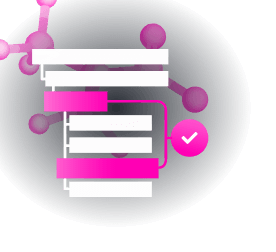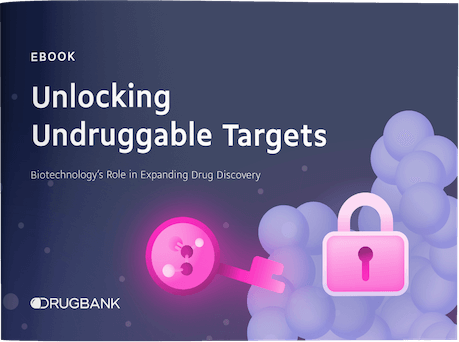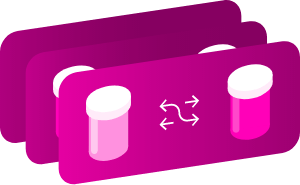Explore a selection of our essential drug information below, or:
Identification
- Generic Name
- Bicine
- DrugBank Accession Number
- DB03709
- Background
Not Available
- Type
- Small Molecule
- Groups
- Experimental
- Structure
- Weight
- Average: 163.1717
Monoisotopic: 163.084457909 - Chemical Formula
- C6H13NO4
- Synonyms
- Bicene
- Diethanol glycine
- Diethylolglycine
- Dihydroxyethylglycine
- N,N-Dihydroxyethyl glycine
- N,N-Dihydroxyethylglycine
- External IDs
- NSC-7342
- NSC-7512
Pharmacology
- Indication
Not Available
 Reduce drug development failure ratesBuild, train, & validate machine-learning modelswith evidence-based and structured datasets.Build, train, & validate predictive machine-learning models with structured datasets.
Reduce drug development failure ratesBuild, train, & validate machine-learning modelswith evidence-based and structured datasets.Build, train, & validate predictive machine-learning models with structured datasets.- Contraindications & Blackbox Warnings
 Prevent Adverse Drug Events TodayTap into our Clinical API for life-saving information on contraindications & blackbox warnings, population restrictions, harmful risks, & more.Avoid life-threatening adverse drug events with our Clinical API
Prevent Adverse Drug Events TodayTap into our Clinical API for life-saving information on contraindications & blackbox warnings, population restrictions, harmful risks, & more.Avoid life-threatening adverse drug events with our Clinical API- Pharmacodynamics
Not Available
- Mechanism of action
Target Actions Organism APlasminogen inhibitorHumans UMembrane-bound lytic murein transglycosylase B Not Available Escherichia coli (strain K12) UUDP-galactopyranose mutase Not Available Mycobacterium tuberculosis - Absorption
Not Available
- Volume of distribution
Not Available
- Protein binding
Not Available
- Metabolism
- Not Available
- Route of elimination
Not Available
- Half-life
Not Available
- Clearance
Not Available
- Adverse Effects
 Improve decision support & research outcomesWith structured adverse effects data, including: blackbox warnings, adverse reactions, warning & precautions, & incidence rates. View sample adverse effects data in our new Data Library!Improve decision support & research outcomes with our structured adverse effects data.
Improve decision support & research outcomesWith structured adverse effects data, including: blackbox warnings, adverse reactions, warning & precautions, & incidence rates. View sample adverse effects data in our new Data Library!Improve decision support & research outcomes with our structured adverse effects data.- Toxicity
Not Available
- Pathways
- Not Available
- Pharmacogenomic Effects/ADRs
- Not Available
Interactions
- Drug Interactions
- This information should not be interpreted without the help of a healthcare provider. If you believe you are experiencing an interaction, contact a healthcare provider immediately. The absence of an interaction does not necessarily mean no interactions exist.Not Available
- Food Interactions
- Not Available
Categories
- Drug Categories
- Chemical TaxonomyProvided by Classyfire
- Description
- This compound belongs to the class of organic compounds known as alpha amino acids. These are amino acids in which the amino group is attached to the carbon atom immediately adjacent to the carboxylate group (alpha carbon).
- Kingdom
- Organic compounds
- Super Class
- Organic acids and derivatives
- Class
- Carboxylic acids and derivatives
- Sub Class
- Amino acids, peptides, and analogues
- Direct Parent
- Alpha amino acids
- Alternative Parents
- Trialkylamines / Amino acids / 1,2-aminoalcohols / Monocarboxylic acids and derivatives / Carboxylic acids / Primary alcohols / Organopnictogen compounds / Organic oxides / Hydrocarbon derivatives / Carbonyl compounds
- Substituents
- 1,2-aminoalcohol / Alcohol / Aliphatic acyclic compound / Alkanolamine / Alpha-amino acid / Amine / Amino acid / Carbonyl group / Carboxylic acid / Hydrocarbon derivative
- Molecular Framework
- Aliphatic acyclic compounds
- External Descriptors
- bicine (CHEBI:40957)
- Affected organisms
- Not Available
Chemical Identifiers
- UNII
- 1J484QFI1O
- CAS number
- 150-25-4
- InChI Key
- FSVCELGFZIQNCK-UHFFFAOYSA-N
- InChI
- InChI=1S/C6H13NO4/c8-3-1-7(2-4-9)5-6(10)11/h8-9H,1-5H2,(H,10,11)
- IUPAC Name
- 2-[bis(2-hydroxyethyl)amino]acetic acid
- SMILES
- OCCN(CCO)CC(O)=O
References
- General References
- Not Available
- External Links
- Human Metabolome Database
- HMDB0011727
- PubChem Compound
- 8761
- PubChem Substance
- 46505980
- ChemSpider
- 8431
- ChEBI
- 39066
- ZINC
- ZINC000001683490
- PDBe Ligand
- BCN
- Wikipedia
- Bicine
- PDB Entries
- 1ki0 / 1kmi / 1ltm / 1qdr / 1qus / 1v0j / 2a81 / 2jc5 / 2ov5 / 2r4j … show 133 more
Clinical Trials
- Clinical Trials
Clinical Trial & Rare Diseases Add-on Data Package
Explore 4,000+ rare diseases, orphan drugs & condition pairs, clinical trial why stopped data, & more. Preview package Phase Status Purpose Conditions Count Start Date Why Stopped 100+ additional columns Unlock 175K+ rows when you subscribe.View sample data
Pharmacoeconomics
- Manufacturers
- Not Available
- Packagers
- Not Available
- Dosage Forms
- Not Available
- Prices
- Not Available
- Patents
- Not Available
Properties
- State
- Solid
- Experimental Properties
- Not Available
- Predicted Properties
Property Value Source Water Solubility 182.0 mg/mL ALOGPS logP -1.6 ALOGPS logP -4.4 Chemaxon logS 0.05 ALOGPS pKa (Strongest Acidic) 1.52 Chemaxon pKa (Strongest Basic) 9.15 Chemaxon Physiological Charge 0 Chemaxon Hydrogen Acceptor Count 5 Chemaxon Hydrogen Donor Count 3 Chemaxon Polar Surface Area 81 Å2 Chemaxon Rotatable Bond Count 6 Chemaxon Refractivity 38.66 m3·mol-1 Chemaxon Polarizability 16.3 Å3 Chemaxon Number of Rings 0 Chemaxon Bioavailability 1 Chemaxon Rule of Five Yes Chemaxon Ghose Filter No Chemaxon Veber's Rule No Chemaxon MDDR-like Rule No Chemaxon - Predicted ADMET Features
Property Value Probability Human Intestinal Absorption + 0.5497 Blood Brain Barrier - 0.6707 Caco-2 permeable - 0.5785 P-glycoprotein substrate Non-substrate 0.5636 P-glycoprotein inhibitor I Non-inhibitor 0.9519 P-glycoprotein inhibitor II Non-inhibitor 0.9114 Renal organic cation transporter Non-inhibitor 0.7777 CYP450 2C9 substrate Non-substrate 0.8272 CYP450 2D6 substrate Non-substrate 0.8352 CYP450 3A4 substrate Non-substrate 0.7483 CYP450 1A2 substrate Non-inhibitor 0.884 CYP450 2C9 inhibitor Non-inhibitor 0.9328 CYP450 2D6 inhibitor Non-inhibitor 0.9384 CYP450 2C19 inhibitor Non-inhibitor 0.9445 CYP450 3A4 inhibitor Non-inhibitor 0.9316 CYP450 inhibitory promiscuity Low CYP Inhibitory Promiscuity 0.9702 Ames test Non AMES toxic 0.9109 Carcinogenicity Non-carcinogens 0.803 Biodegradation Ready biodegradable 0.6536 Rat acute toxicity 1.7569 LD50, mol/kg Not applicable hERG inhibition (predictor I) Weak inhibitor 0.7521 hERG inhibition (predictor II) Non-inhibitor 0.9028
Spectra
- Mass Spec (NIST)
- Not Available
- Spectra
- Chromatographic Properties
Collision Cross Sections (CCS)
Adduct CCS Value (Å2) Source type Source [M-H]- 134.7824022 predictedDarkChem Lite v0.1.0 [M-H]- 134.9310022 predictedDarkChem Lite v0.1.0 [M-H]- 129.96184 predictedDeepCCS 1.0 (2019) [M+H]+ 134.3116022 predictedDarkChem Lite v0.1.0 [M+H]+ 134.5073022 predictedDarkChem Lite v0.1.0 [M+H]+ 133.11133 predictedDeepCCS 1.0 (2019) [M+Na]+ 133.0392022 predictedDarkChem Lite v0.1.0 [M+Na]+ 132.9321022 predictedDarkChem Lite v0.1.0 [M+Na]+ 141.89665 predictedDeepCCS 1.0 (2019)
Targets

Build, predict & validate machine-learning models
Use our structured and evidence-based datasets to unlock newinsights and accelerate drug research.
Use our structured and evidence-based datasets to unlock new insights and accelerate drug research.
- Kind
- Protein
- Organism
- Humans
- Pharmacological action
- Yes
- Actions
- Inhibitor
- General Function
- Plasmin dissolves the fibrin of blood clots and acts as a proteolytic factor in a variety of other processes including embryonic development, tissue remodeling, tumor invasion, and inflammation. In ovulation, weakens the walls of the Graafian follicle. It activates the urokinase-type plasminogen activator, collagenases and several complement zymogens, such as C1 and C5. Cleavage of fibronectin and laminin leads to cell detachment and apoptosis. Also cleaves fibrin, thrombospondin and von Willebrand factor. Its role in tissue remodeling and tumor invasion may be modulated by CSPG4. Binds to cells
- Specific Function
- apolipoprotein binding
- Gene Name
- PLG
- Uniprot ID
- P00747
- Uniprot Name
- Plasminogen
- Molecular Weight
- 90568.415 Da
References
- Overington JP, Al-Lazikani B, Hopkins AL: How many drug targets are there? Nat Rev Drug Discov. 2006 Dec;5(12):993-6. [Article]
- Imming P, Sinning C, Meyer A: Drugs, their targets and the nature and number of drug targets. Nat Rev Drug Discov. 2006 Oct;5(10):821-34. [Article]
- Zhou Y, Zhang Y, Zhao D, Yu X, Shen X, Zhou Y, Wang S, Qiu Y, Chen Y, Zhu F: TTD: Therapeutic Target Database describing target druggability information. Nucleic Acids Res. 2024 Jan 5;52(D1):D1465-D1477. doi: 10.1093/nar/gkad751. [Article]
- Kind
- Protein
- Organism
- Escherichia coli (strain K12)
- Pharmacological action
- Unknown
- General Function
- Murein-degrading enzyme. Catalyzes the cleavage of the glycosidic bonds between N-acetylmuramic acid and N-acetylglucosamine residues in peptidoglycan. May play a role in recycling of muropeptides during cell elongation and/or cell division.
- Specific Function
- calcium ion binding
- Gene Name
- mltB
- Uniprot ID
- P41052
- Uniprot Name
- Membrane-bound lytic murein transglycosylase B
- Molecular Weight
- 40255.55 Da
References
- Kind
- Protein
- Organism
- Mycobacterium tuberculosis
- Pharmacological action
- Unknown
- General Function
- Catalyzes the interconversion through a 2-keto intermediate of uridine diphosphogalactopyranose (UDP-GalP) into uridine diphosphogalactofuranose (UDP-GalF) which is a key building block for cell wall construction in Mycobacterium tuberculosis.
- Specific Function
- flavin adenine dinucleotide binding
- Gene Name
- glf
- Uniprot ID
- P9WIQ1
- Uniprot Name
- UDP-galactopyranose mutase
- Molecular Weight
- 45814.07 Da
Drug created at June 13, 2005 13:24 / Updated at August 26, 2024 19:22


